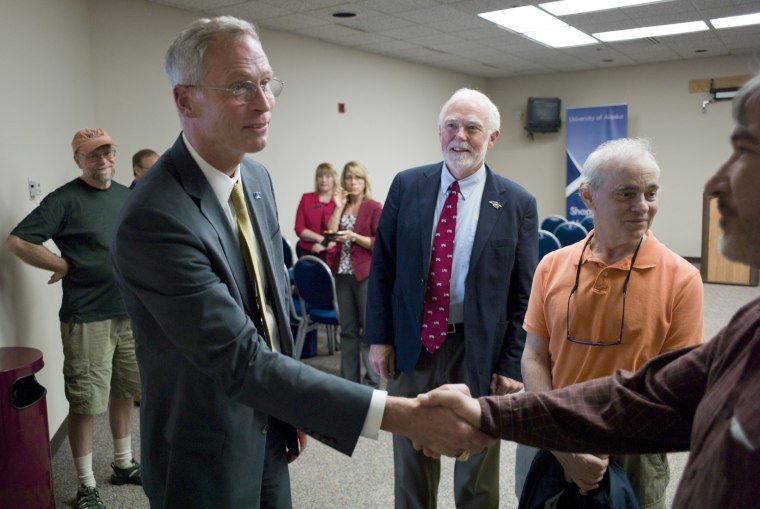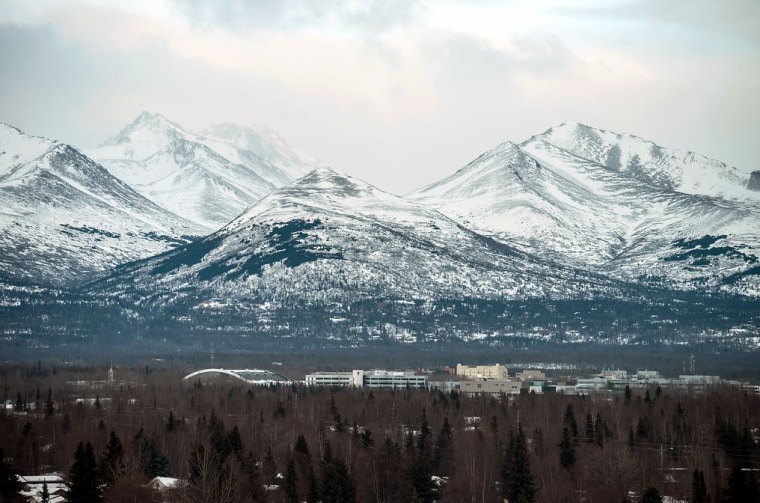Greg Knight has lived in Alaska his entire life.
It’s where he went to school, raised his family, and planned to retire. But after Gov. Mike Dunleavy's recent veto of the state budget, which cut $130 million of state funding for the University of Alaska system, Knight said he might have to leave his beloved state.
When he heard the news, he started packing up the home he’s owned in Anchorage for 20 years.
“It’s heartbreaking,” he said, but equivalent jobs just don’t exist in the state. “If this goes through, I could find myself unemployed in a matter of 60 days.”
Knight, 53, is a fiscal manager at the University of Alaska Anchorage, a job he doesn’t think will be around if the veto stays. “I’ll have to leave Alaska,” he said.
If Dunleavy has his way, the university says it will have to eliminate 1,300 jobs, close entire campuses, lay off tenured faculty, and shutter academic programs. "We may not even be able to mow the lawns," university Chancellor Cathy Sandeen told NBC News.
Lawmakers and university administrators knew the state would cut $5 million from the budget, which seemed manageable and foreseeable considering Alaska has reduced its financial support of its university system four out of the past five years. But the extra $130 million added on by the Republican governor’s veto, totaling a 41 percent cut in the state funding, blindsided the university.
The state Legislature has until July 12 to overturn the veto, but it needs support from three-fourths of the legislators. State political experts say it will be an uphill battle, and they will need to whip votes fast — right now it hinges on about six undecided Republicans.
If the cuts happen, “the university will drastically change overnight,” Sandeen said. She and others say Knight isn’t the only one who will leave the state, and fear an impending “brain drain.”
“It would take decades to reverse this damage,” Sandeen said. “We would see a reduction in student enrollment.
Sandeen, who has worked in public higher education for the past 30 years around the country, said, “I have never seen cuts of this magnitude.”
Alaska is not alone in its struggle to secure state funding for its university system. Research from the Center on Budget and Policy Priorities shows that 45 states received state funding in 2018 far below pre-recession levels — driving up tuition, reducing academic opportunities and student services, and deterring low-income students from enrolling, all while student debt soars. But the northernmost state’s situation is unique both because of its geography and the sheer size of the cuts.
The University of Alaska System has three universities, and 16 campuses, some of which aren’t accessible by land. A large portion of students, whose median age is 25, work while they study, commuting to their nearest regional campus, and the three main campuses only have an on-campus student housing of five to 10 percent. Around 16 percent of students attending the system during the fall of 2018 were Alaska Natives, many of whom want to remain on their tribal lands as they study. If the cuts go through, regional campuses will close, and students won’t have anywhere else to go.
The cuts worry Sandeen for many reasons, but she is focused on their “human costs.” She says her college faces a loss of 700 jobs. “There will not be 700 replacement jobs for those people,” she said. “Meanwhile, in the Lower 48, the economy and job market is hot.”
Jim Johnsen, the president of the University of Alaska System, has the same concerns. Alaska’s population is declining, and the state has a 6.4 percent unemployment rate, the highest in the country. Johnsen says the state’s isolation exacerbates this issue.
“If we lay people off, they aren’t going to walk across the street and get another job at another company, because we’re it.” Alaska has almost no private four-year institutions, and what it does have are minuscule and religiously-affiliated schools.

Dunleavy's office did not respond to a request for comment but he's said recently, "Over the past several years we have used $14 billion from our savings to subsidize the government. This situation, everyone agrees, is not sustainable.”
If the cuts go through, Johnsen will have to scrap entire programs, and highly-skilled professionals and university researchers will leave. Even more, students will look to other states for their higher education, especially because Alaska has tuition reciprocity with other Western states. This worries Johnsen, who feels certain the cuts will worsen the “brain drain” — only 20 percent of students who leave Alaska for higher education return after graduation.
With the state’s education system in such disarray, he worries it’s more than just a brain drain.
“It’s a brain gusher," he said.
Programs unique to Alaska will go away too. Many of the regional campuses are in predominantly Alaska Native communities, and have programs in Alaska Native languages and culture that — like all programs — will face cuts. This is one of the many reasons the cuts worry Sara Eliza Johnson, an English professor at the University of Alaska Fairbanks. She says the cuts will force some indigenous students to “choose between leaving tribal lands to receive a quality education outside the state and staying at home to participate in their cultural communities.”
“The ripple effect will be devastating,” she said.
Knight said he isn’t hopeful about the veto override, and is getting ready to put his Anchorage home on the market. He and his wife are thinking of moving to Oklahoma, where they have family, or Oregon, where he sees job opportunities.
“I’m an accountant, I’ve spent my life working with numbers,” he said. “But it’s about the people of the state, too.”

